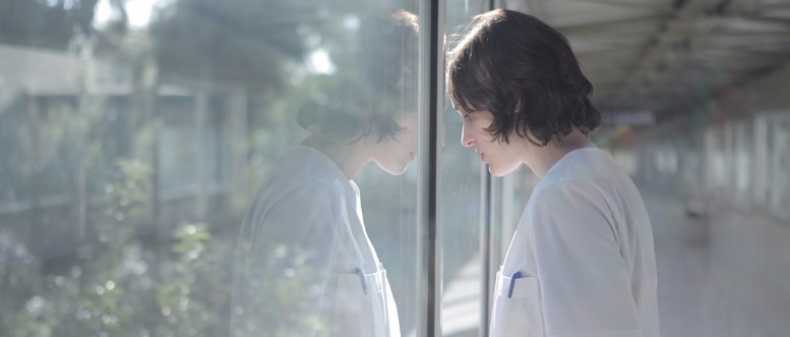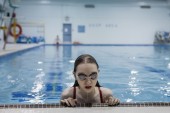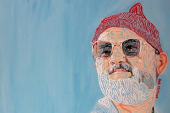
It’s difficult to describe the film ALPS in much detail without compromising its uncanny effect. Suffice it to say that Yorgos Lanthimos’ new film, which was a favourite film from TIFF 2011, shares certain elements with his previous Dogtooth, including a female lead (Aggeliki Papoulia) and an extreme mode of living, but it’s a far more complicated, suggestive work. The central characters, the group of Alps, begin “substituting” for dead loved ones, and as their roles bleed into each other the borders between performance and identity become ever harder to discern. Often squicky/funny at the same time, ALPS‘ final shot is a disturbing melange of succour and horror. I spoke about all this during last year’s festival with Lanthimos, whose movie premieres at the Lightbox this weekend.
Like Dogtooth, ALPS begins with the characters caught up in a bizarre, all-consuming situation, though it’s by choice this time. Was the nature of the Alps group inspired by anything in particular?
Yorgos Lanthimos: The initial idea came just by discussing it with the co-writer–we wrote the script together. It was a thought that he had about people asking other people to write them letters, like there is someone who has died, a loved one that they’ve lost. So we started developing it from there, because it seemed like an interesting idea but not cinematic enough, making a film about people writing letters. We kept thinking about it because we liked the idea of loss, and how can you ever replace someone, is that possible, how bad it can go. And then we thought of the story of this nurse working in this hospital, and these other people working with her that are actually substituting people, physically pretending to be other people.
The substitutes are all actors in a sense, and they repeatedly ask the loved ones of a potential “role” who the deceased’s favourite movie star was. But they also seem to be fixated on celebrity in general–as a Prince obsessive, I thought the gymnast’s take on the singer might be the film’s funniest moment. Do you think that’s because famous actors or pop stars perform personae in a similarly forthright way?
YL: I think to us mainly it’s because film stars and pop stars are part of our everyday culture, and that’s a very global thing, it’s the same thing to anyone. When you ask someone “who’s your favourite actor?” in any part of the world, you’re probably going to get similar answers. Of course, they’re going to ask you: You mean, foreign, or in the country where you are? But there’s this common global thing, common culture, and it’s part of everyday life, in a very simplistic way, to define someone’s taste or personality by inquiring about who his favourite actor or singer is, his favourite band.
In a Q&A after the screening I saw, you mentioned that many of the cast members are non-actors. Could you elaborate on that? How did you find them?
YL: Most of them are friends or people that I saw someplace or I just met and I remembered. I just felt while I was looking for people to be in this film that they would be perfect for the part. I mean, for me the most important part of the people that are in the film is to be able to choose them right, and not to try and make them afterwards into something that I have imagined. So it’s a very important process for me and I take a lot of time with it. I’m always searching and noticing people and people’s behaviours, things like that. Try to keep them in mind for the next film. When I’m looking for someone, things come back, or I start asking people, if they know someone for something like this.
When the nurse re-enacts a lovers’ quarrel with one of her clients, they exchange flat, stilted, unknowingly comic recitations of English-language dialogue, which causes multiple levels of roleplaying to blur together. Did moments like that ever threaten to dissolve your own existing notions of “good” and “bad” acting?
YL: No, because I think it was pretty clear–just because it wasn’t their language, it added that elevated kind of awkwardness. That’s a complex scene, also, because it has the part with them rehearsing the lines, which is much more low-key and much more natural, and then you see them acting them out badly, by raising their voices, basically.
The depth of field is very shallow in most of the scenes, and only what’s closest to the camera is usually in focus. I was wondering why you made that choice.
YL: Well, first of all, I think it’s beautiful. It adds depth to the image, not just in a visual-aesthetic way, but at a different level. And the other very important reason was that I wanted to focus on telling the story through one person’s point of view, or to have a limited point of view on the film and on the story–not to try to go around to every sub-story, every sub-character, try to show everything and be analytical. I wanted to be simple and find the most important thing in each scene, and just show that. Let people come into the scene and be more involved in the scene and figure out things on their own and discover what’s going on around this person that we’re following. Another thing is that it made all these people around them have a kind of ghostly quality, which blended with the atmosphere of the film in a way. It’s not a logical way, but it just kind of felt right.
Mont Blanc [the Alps’ leader] forbids the Alps from sleeping with their clients, but the nurse does so anyway, resulting in a carefully choreographed, deeply awkward and very funny sex scene. Did you intend any social commentary with that sequence? I read an old interview where you said that the son’s special treatment in Dogtooth mirrors traditional Greek attitudes about adolescent sexuality…
YL: No, that was just pure sex [both laugh].
Fair enough. The camera seems to be preoccupied with kinetic performances in ALPS, whether it’s one of several dance sequences or the black comedy of that hospital-room tennis game. How much time did you spend working on physicality during rehearsals?
YL: Actually, this time we didn’t have a lot of rehearsals before shooting the film. The main reason was that after I chose the people, many of them non-actors, and had them meet with the actors and go through the scenes, it just felt very right. It seemed like we had made great choices and I didn’t want to spoil this thing that was happening between them, so I decided not to work with them and wait until the time we would shoot the scenes. I just made sure that when we were actually shooting the scenes we would have more time if something went wrong, so we could work on it. The thing is that I always work physically, whatever the scene might be, if it’s dancing so it’s more obviously physical, or if it’s something completely different, I always try to work in a very practical and physical way. We don’t really get into psychology and sentiments and feelings and motivations of characters and all these kinds of things. So I guess one of the reasons that we like to use a lot of physicality and dancing scenes is that we can express so much through that. It’s a very important part of our world.
I think the most popular clip from Dogtooth on Youtube is the dance sequence from that film, the Flashdance one. How much improvisation was there?
YL: Many times, after finishing shooting the scenes that were scheduled, we would shoot a couple more scenes that just came to mind on the spot. Some of them ended up in the film, some of them not, and some of the scenes that were written also didn’t end up in the final cut. There’s a mixture. We have this script, and it’s very strict, it’s there, and we didn’t have any rehearsals, so basically sometimes I didn’t even let the actors know all their lines–especially, for instance, with Mont Blanc, I didn’t let him memorize his lines. I just let him read the script once and then [act] the way he remembered it. Take by take he would get closer to what the script was, or we would give him hints about what the rest he had to say was, and he would construct it in his own way. And in the end we actually had him saying the script without ever really memorizing it. There’s different ways of improvising.
It’s funny that you sort of took control away from him like that, because I actually thought he was similar to the father in Dogtooth in some ways, they’re both these capricious, arbitrary tyrants of their little social units.
YL: Yeah. Yeah [laughter].
How have the huge spending cuts and ongoing economic crises in Greece affected filmmakers there? Is it becoming harder and harder to find public funding or private financial backers?
YL: It’s a little worse. It’s not a huge difference because there was always a problem. I mean, there wasn’t any proper funding–there’s no private funding in Greece for films–it was always government-funded through the Greek Film Centre and the Ministry of Culture. And there was always a problem. First of all, until five years ago there were no young people getting financed. There were these older known directors that would get all the money and make their films.
Lately the situation changed and they were trying to support the younger filmmakers; they didn’t really have a lot of money, so you would get financed, but it’s in theory, you would be getting money for the next few years after you finished the film, so you had to find a way to actually make the film without paying the people, or finding the money from somewhere else, and then you would get it back in the next two-three years from the Greek Film Centre. Now the situation is like: “We don’t have any money, so we cannot give you any money not even in two years.”
We still haven’t fully financed ALPS, we still owe money to people, again people had to work for free. And now that the film was in Venice, the Greek Film Centre could actually come in and help us out, because before when we were actually making the film they said, “we don’t have any money, we cannot help you.” Now they’re trying to get themselves together, they’re supporting it. But again, it’s very difficult. We’re in our second festival and we still haven’t really paid for the film.
I saw that even [Greek Prime Minister George] Papandreou lauded Dogtooth, once it got an Oscar nomination.
YL: Yeah, it’s a big deal for us, but there’s not much being done to support this thing. It’s quite ironic, I have to say. I think the success is one of our very few decent presentations and positive presentations outside Greece [recently], and it’s hard to support that and sustain that, because there’s nothing coming. There’s no ground to build on the success of Greek films, there’s no film schools, proper funding…there’s no priority to support this thing. Even that Dogtooth had such success, we had to take the risk ourselves and make the film, and have all these people unpaid, this constant stress. And after the film is in Venice we get support from the Greek Film Centre, it seems kind of… how would I describe it… well, it doesn’t give you a lot of hope for the future.
What is it that Mont Blanc says at one point? “You won’t get paid this week”?
YL: Yeah, “I’ll keep it” [laughs]. Now we’ve gotten paid, at least, but we had to go through a lot.
The TIFF Bell Lightbox is screening ALPS at 3:30 and 8:30 pm, starting today (8:30 only on Monday). Buy Tickets Here: ALPS Toronto
____
Chris Randle is the culture editor at Toronto Standard. Follow him on Twitter at @randlechris.
For more, follow us on Twitter at @TorontoStandard, and subscribe to our newsletter.














